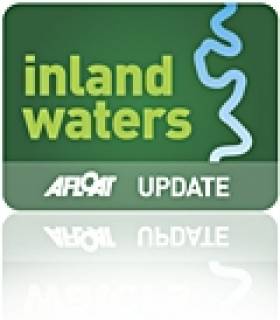Displaying items by tag: Silicon
#workspace – As Afloat.ie reported last week, "DoSpace.ie" Ireland's newest and most unique CoWorking space launched today in Grand Canal Dock, part of Dublin's Silicon Docks area on Ireland's Inland Waterways.
Occupying an 800 square foot, state of the art barge, DoSpace provides CoWorkers with short or long term desk space in Dublin 2.
It was founded by Graham Barker following his own fruitless search for reasonably priced and fun Silicon Docks office space. Graham, with support from Waterways Ireland, sourced and refitted The Grey Owl, one of Ireland's premier barges. The result, according to Barker, is both an affordable solution and a quirky work environment.
Speaking about the project, Graham said, "This is the kind of place that people want to work in – it's centrally located, next to the Dart, a Dublin Bikes stand across the road, beside all the big tech companies, and we are on the water! Everyone I've met has been very supportive – from Waterways Ireland to the CoWorking space community. I think most people can see the benefit that we bring to the area, and the sheer value that we offer to startups".
Commenting on the new start-up, Dawn Livingstone - Waterways Ireland Chief Executive said "We are really happy to have been able to work with DoSpace to bring this CoWorking business to the Grand Canal Dock. The Dock offers unique opportunities for business with the focus of technology businesses here in the area. There is an excellent range of startup and high growth businesses ready to take advantage of DoSpace CoWorking"
Grand Canal Dock is referred to as Silicon Docks because of the large concentration of technology companies and is seen by many as a symbol of Ireland's economic recovery. Tech giants like Facebook and Google, together with a myriad of smaller technology companies, have their European headquarters located here alongside incubation centres, such as Trinity's Technology and Enterprise campus.
One early adopter of DoSpace is Security First, a London based start-up creating tech to help human rights defenders work safely. Co-founder, Holly Kilroy, said "I've been blown away by the location and how useful the DoSpace community has been to us already. Having such a well connected CoWorking space in Dublin has saved us time and money and made it easier to move the company home."
DoSpace Dublin will be managed by David Bragason, DoSpace's Dublin's Community Manager. Tours of the DoSpace barge can be booked via their website at http://www.dospace.ie or by contacting David at 01 539 7935. Membership plans start from €50 a month. DoSpace is giving 10% of their desk space free of charge to nonprofit technology based startups.






























































